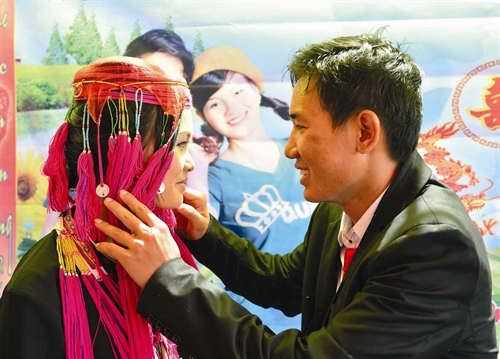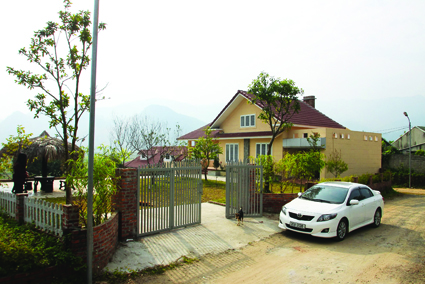From January 1 next year, the new Law on Marriage and Family (the Law) will come into force, providing a sufficient legal mechanism for the effective exercise of human rights and citizens’ rights in the field of marriage and family, especially with regard to gender equality and the protection of children, mothers and disadvantaged members of society.
Composed of 133 articles arranged in nine chapters, the Law regulates the marriage and family regime, legal standards for the conduct of family members, and duties of individuals, organizations, the State and society in the building and consolidation of the marriage and family regime.
Compared to the current law, the Law has many significant changes.
 |
A bridegroom of Dao Thanh Y ethnic group (Bac Giang province) unveils his bride’s face__Photo: Thanh Ha/VNA |
Non-recognition of same-sex marriage
The Law lifts the current ban on marriage between persons of the same sex. However, it affirms that the State does not recognize marriage between persons of the same sex. Accordingly, they may marry but will not be protected by law if conflicts occur.
Altruistic gestational surrogacy
Instead of forbidding all types of gestational surrogacy, the Law recognizes and permits altruistic gestational surrogacy.
Carrier party and gestational surrogacy requesting party must satisfy strict conditions specified in Article 95 of the Law. Husband and wife have the right to ask for a person’s gestational surrogacy when the wife is certified by a qualified hospital as unable to carry a pregnancy and give birth even with assisted reproductive technology. The couple must has no common child and receive medical, legal and psychological counseling. For a gestational carrier, she must be a next of kin of the same line of gestational surrogacy requesting party. She has given birth and is permitted for gestational surrogacy only once. She must be at a suitable age and certified by a qualified hospital to be eligible for gestational surrogacy. If she is married, her husband’s written consent must be obtained. She must also have received medical, legal and psychological counseling.
The Law also clearly defines rights and obligations of gestational carrier party and gestational surrogacy requesting party.
As required by the Law, altruistic gestational surrogacy must be based on the voluntariness of involved parties and established in writing. Written agreement on altruistic gestational surrogacy must be notarized.
Disputes over giving birth with altruistic gestational surrogacy will be settled by the court. When both husband and wife being the gestational surrogacy requesting party die or lose their civil act capacity before the child is delivered to them, the gestational carrier party has the right to raise this child. If she refuses to raise the child, the guardianship and support for the child must comply with the Law and the Civil Code.
Marriage and family relations involving foreign elements
Unless otherwise provided by the Law, Vietnamese legal provisions on marriage and family will be applicable to marriage and family relations involving foreign elements.
The Law devotes a whole chapter, Chapter VIII, to dealing with marriage and family relations involving foreign elements. This Chapter has some amendments compared to current regulations. It details consular legalization of papers and documents on marriage and family. Accordingly, papers established, granted or certified by competent foreign agencies for use in the settlement of cases and matters related to marriage and family must be legally certified, except cases eligible for exemption from consular legalization under treaties to which Vietnam is a contracting party or on the principle of reciprocity. The recognition of foreign courts’ judgments and rulings on marriage and family with requests for enforcement in Vietnam must comply with the Civil Procedure Code.
The Law also adds provisions on application of the agreed matrimonial property regime and the settlement of consequences of the cohabitation of men and women as husband and wife without inter-country marriage registration.
The Government will issue detailed regulations on the settlement of marriage and family relations involving foreign elements in order to protect lawful rights and interests of parties.- (VLLF)


